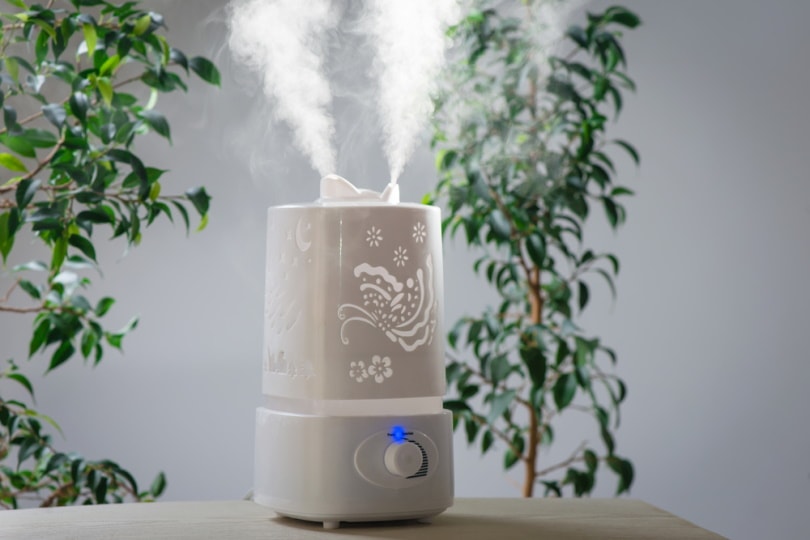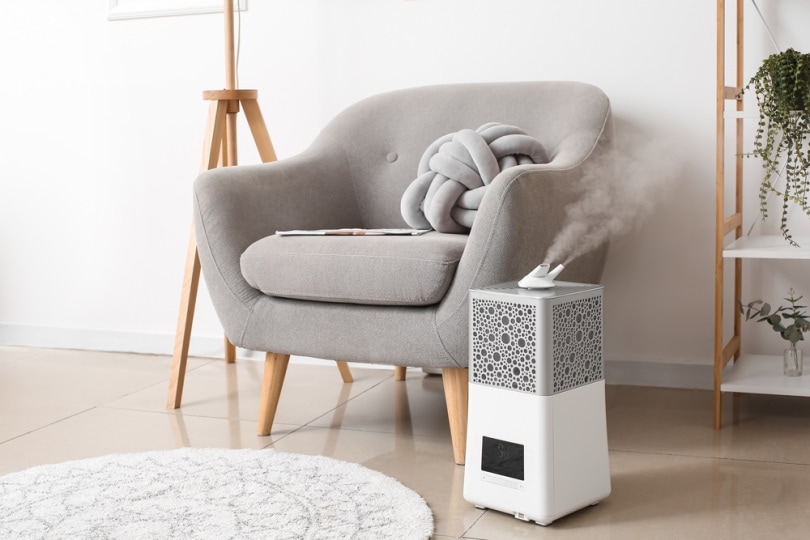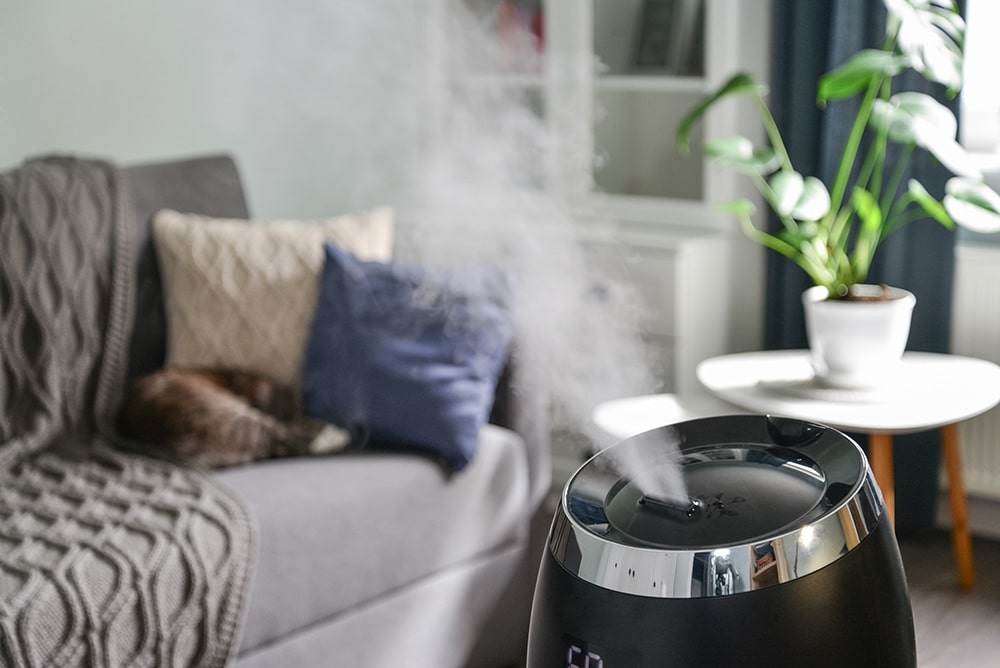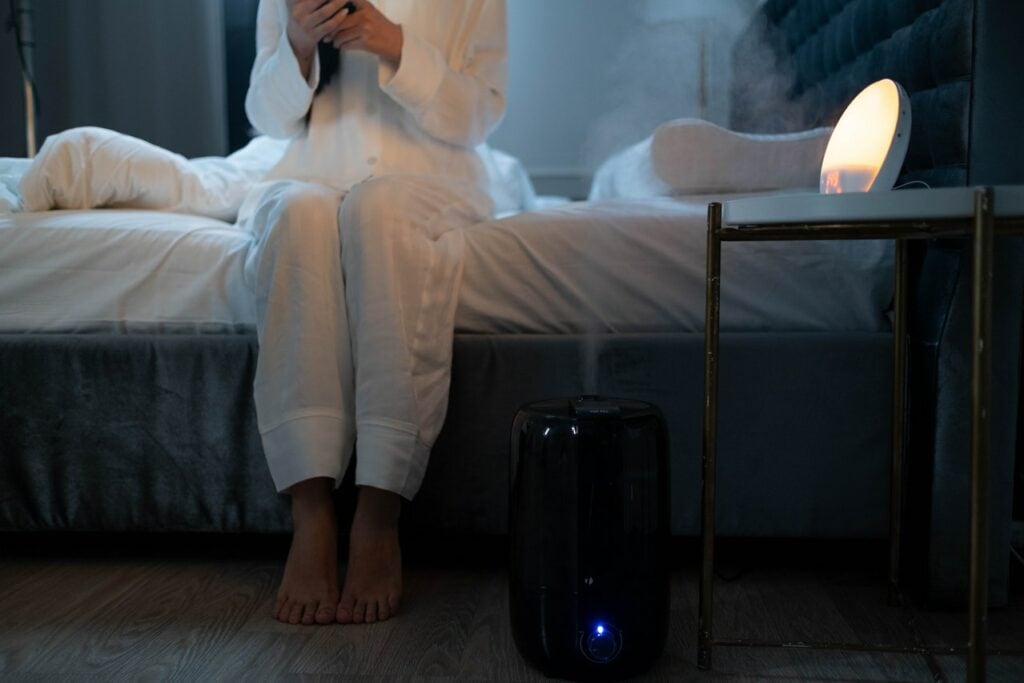What Do Humidifiers Do? Advantages, Disadvantages & Types
-
Shea Cummings
- Last updated:

Many of us experience the adverse effects that dry air has on our bodies. Whether it’s dry, cracked lips or the uncomfortable symptoms of dry eye syndrome, a humidifier is an incredible tool that can drastically improve our quality of life.
A humidifier doesn’t just benefit our bodies either. An ideal indoor humidity also helps certain types of flooring or furniture last longer. This article explores what humidifiers are and how they can help our bodies and our homes.

How Does it Work?
At its core, a humidifier creates humid air and pushes it into a room to raise the ambient humidity level. Depending on which type of humidifier you have will determine how this happens. But all have the same result: they increase the moisture in the air.
It’s worth mentioning that you don’t actually need a humidifier unit to increase humidity in your home. If you don’t have the budget to invest in a humidifier, you can achieve similar results in other ways.
For example, boiling a pot of water on the stove will increase relative humidity. Or you could drape a wet cloth or rag over heat vents, creating humid air as you heat the home.
According to the mayo clinic, the ideal humidity levels for the average home are between 30% and 50%. These levels give you the best balance of benefits without causing problems.

What Are the Different Types of Humidifiers?
Most humidifiers perform the same job; they simply do it differently. Let’s take a look at some of the most common types of humidifiers you’ll encounter:
- Central Humidifier: You’ve probably heard of central air conditioning that is built into a home. The same is true for a central humidifier. These units are built into that same system and are meant to keep the whole house humid.
These other four types are standalone units designed to provide humidity to one or several rooms:
- Impeller Humidifier: A rotating disk in the blower motor of these units is responsible for circulating humidity and pushing it into the room.
- Steam Vaporizer: A steam vaporizer actually heats water to create steam vapor with electricity, then cools it before blowing it into the room. These provide incredible humidity, but they should be avoided with small children around, as the hot water in the tank can be hazardous.
- Evaporator: An evaporator humidifier does its job by circulating air through a wet wick or band into the room.
- Ultrasonic humidifier: As it sounds, this humidifier uses ultrasonic vibrations to produce a cool mist that it releases into the air.
Many humidifiers come with sensors that automatically turn on and off based on the humidity level in a room. Some of them even have displays showing you the levels, so you can adjust the unit accordingly to maintain an ideal humidity level of 30%–50%.

Where Is It Used?
There are many applications where you would want a humidifier. For example, if most of your negative dry air symptoms are overnight or when you wake up, a standalone unit in your room will probably be sufficient.
Another application for a standalone unit could be at work. A small desk-sized humidifier is a great option if you find the office air is dry and uncomfortable.
If you live somewhere that has an arid climate for most or all of the year, it may be worth investing in a central humidifier. Many people already have central air and heating in these climates. It may be worth contacting an HVAC technician to see how much adding a humidifier to the system would be.
Advantages of a Humidifier
There are several health benefits that a humidifier can provide. In addition, there are several non-health-related bonuses as well.
- Healthier skin
- Lessens respiratory problems (under normal circumstances)
- Helps prevent nosebleeds
- Helps with dry coughs
- Savings on energy bills because the air feels warmer
- Helps prevent the cracking of wooden furniture and floors

Disadvantages of a Humidifier
While there are some great benefits to using a humidifier, there are also some significant disadvantages if the air becomes too humid or the unit is not cleaned and maintained properly.
For example, if you don’t clean a humidifier regularly, it can become a breeding ground for bacteria. Also, if the air is too humid, that can cause bacteria growth within your home. As a result, this will potentially worsen allergic or cold and flu-related symptoms.
In addition, if the humidity is too high in the home, it may create condensation on walls and windows that can damage the paint and other structures. It will also potentially encourage mold growth in problem areas like the kitchen or bathroom.

Frequently Asked Questions
When should I use a humidifier?
The most common time to use a humidifier is when you’re heating your home in the winter. The air is typically drier during this time. In some climates, the air is dry year-round, so a humidifier isn’t a bad idea throughout the year if you’re suffering from any symptoms related to low humidity.
When should I not use a humidifier?
If you use a humidifier, it’s a good idea to monitor the humidity level in your home. If it reaches 50% humidity, you should consider reducing your use of the humidifier as more than 50% can begin to cause additional problems—even if you maintain the unit properly.

Does a humidifier increase oxygen levels?
This is kind of a yes and no answer. Technically, humidity actually displaces oxygen in the air, therefore decreasing it. However, one of the primary things humidity does is attach itself to airborne contaminants like pollen or bacteria. The result is that these things are too heavy to float, thus increasing the natural amount of oxygen available in the air.
Does a humidifier clean the air?
In a way, a humidifier cleans the air in the same way it increases oxygen above. However, a standard humidifier does not clean or filter anything out of the air. That being said, there are some incredible units on the market that not only create humidity but also have filters or other ways of purifying the air. That way, you get the best of both worlds.

Conclusion
Humidifiers are a great tool to increase comfort and well-being at home or work. However, when it comes to humidity, there is a balance between too much and not enough. The best way to ensure you’re on the right track is to use a humidity monitor that shows you relative humidity levels.
Featured Image Credit: Draw05, Shutterstock
Contents